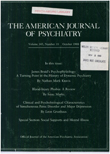Tricyclic antidepressants in obsessive-compulsive disorder: antiobsessional or antidepressant agents? II
Abstract
The authors explored the relationship between the antiobsessional and antidepressant effects of tricyclic drugs in primary obsessive- compulsive disorders. Study 1 consisted of a controlled 12-week trial with clomipramine (N = 7) and placebo (N = 5); study 2 analyzed the pooled data from 15 patients uniformly selected and treated with either clomipramine or imipramine. Although the antiobsessional and antidepressant effects of the drugs covaried, their antidepressant action was not a prerequisite for their antiobsessional effect. The findings suggest that clomipramine and probably imipramine possess specific antiobsessive effects that are at least partially independent of their antidepressant effects.
Access content
To read the fulltext, please use one of the options below to sign in or purchase access.- Personal login
- Institutional Login
- Sign in via OpenAthens
- Register for access
-
Please login/register if you wish to pair your device and check access availability.
Not a subscriber?
PsychiatryOnline subscription options offer access to the DSM-5 library, books, journals, CME, and patient resources. This all-in-one virtual library provides psychiatrists and mental health professionals with key resources for diagnosis, treatment, research, and professional development.
Need more help? PsychiatryOnline Customer Service may be reached by emailing [email protected] or by calling 800-368-5777 (in the U.S.) or 703-907-7322 (outside the U.S.).



